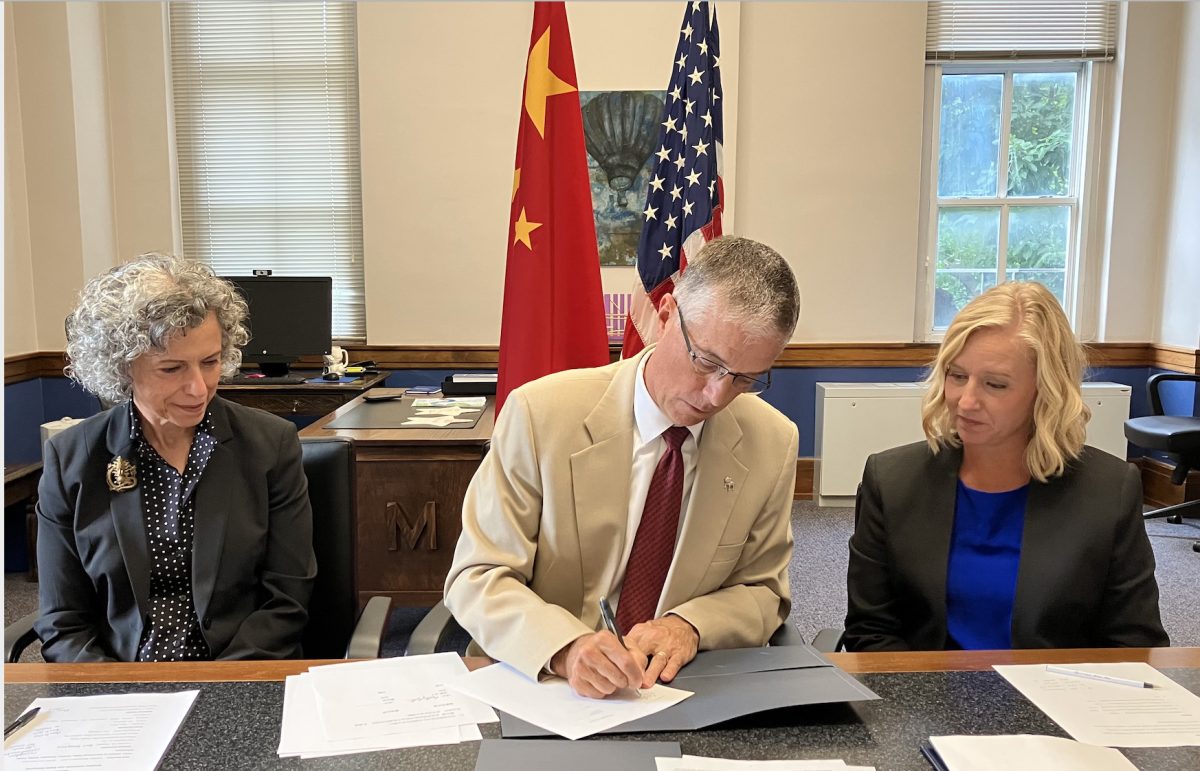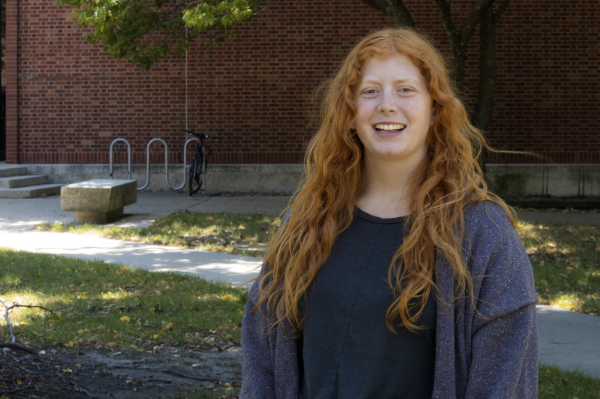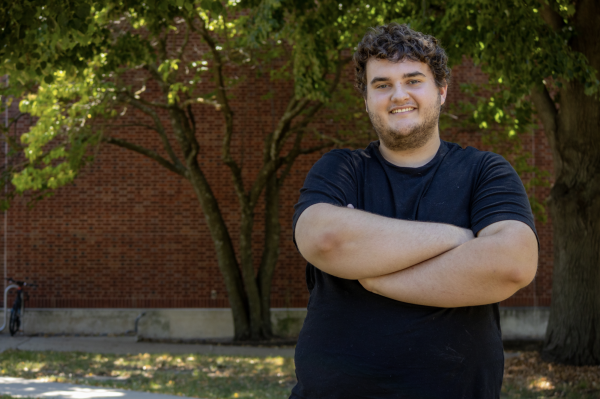All the way in Qingdao, China, students of Qingdao University serenaded Drake faculty with Drake’s fight song. Drake faculty and administrators were there at the end of October and early November to finalize details and examine Qingdao University’s facilities for the partnership between the two universities.
“We were incredibly impressed by what we saw. It was overwhelmingly positive,” Gesine Gerhard, the Drake School of Arts and Sciences dean, said in the Nov. 6 Faculty Senate meeting. “We were sold on the idea of the partnership, of course, before, but when we went there, it made it clear how unique this opportunity is. And we’re honored that Drake was chosen and can do this global partnership with a highly ranked university in China.”
The best part of the trip, Gerhard said, was meeting the students.
“They were just like our students: incredibly dedicated, excited and thrilled to be there. They have really nice things to say and ask,” Gerhard said.
During this trip, President Marty Martin also met with several other universities and members of the Chinese government. He attended an international educational conference, where he said the focus was on Drake and this partnership.
“It was very clear that the central governments and the Ministry of Education approved the Qingdao University and Drake University United College. It carries a very positive and powerful impression on the people we meet,” Martin said in the Nov. 6 Faculty Senate meeting. “They recognized it as an incredibly big deal and looked at Drake with an even more favorable outlook than they would have without that partnership.”
This program has been in the works since the spring of 2022. It will involve cohorts of students from Qingdao University enrolling in a dual degree program. This program will allow students to get a degree from Drake in addition to the one they receive from Qingdao. The current majors offered are data analytics and biology. Additionally, Drake professors will be able to teach at Qingdao University, and expansion will allow more students to travel between universities.
“I think there’s a desire among many Chinese students to have exposure to the Western education experience,” said Eric Manley, co-chair of the data analytics major at Drake. “A lot of times, they try to study abroad, but that’s not possible for many of them, so this is kind of a way to get a little bit of that while being able to stay closer to home.”
Drake has already admitted the first cohort of dual degree students. They are in their first year of university and taking classes that will count towards their Qingdao degree. Throughout the 2025-2026 academic year, the cohort will begin taking Drake-provided courses that count toward their dual degree.
These students must first be admitted to Qingdao University and then apply separately to the dual degree program. Provost Sue Mattison said they are held to the same standards as any student applying to Drake University.
“They are the top students because their competition is so great,” Mattison said.
Drake faculty involved in this program will also travel to and from China. Faculty members will be sent to teach there for up to six months. Drake is currently hiring additional faculty to teach Drake courses at Qingdao. Mattison said hiring American professors will be more cost-effective for the university.
“These students would likely not have the resources to get a degree in a US institution, but it’s very prestigious, so they want to mimic the experience of a US education,” Mattison said. “They want faculty from the US who’ve been trained in US education.”
Qingdao partnership faces challenges
The Qingdao program has been met with challenges from the Chinese government. The Chinese government’s Golden Shield Project started in 2003, sought to increase security in tech communications, including its policy of The Great Firewall, a program to censor select websites. The policy may influence the platforms that the professors can teach with.
Alimoor Reza, a computer science professor who hopes to teach in Qingdao in the coming year, pointed out that Google is banned in China due to The Great Firewall. Drake’s data analytics program tends to rely heavily on Google products, including Google Colab. Despite this challenge, Reza is confident that he can find alternatives.
“As a computer scientist, I always explore tools,” Reza said. “We are not sticking to certain tools throughout our academic life because it’s an evolving field, which means we must adapt and find new solutions.”
The potential for censorship affects more than just the tools professors will teach in person in Qingdao. The Chinese government could reject certain content.
“The Ministry of Education has to approve everything,” Manley said. “We have to make sure that we’re meeting all of their requirements in terms of the number of classes we teach and expected content.”
The recent trip to Qingdao helped ease the worries of censorship for Drake faculty and administrators. This was made possible by clear communication.
“Once we’ve started talking to real [Qingdao] faculty, it’s felt a lot better,” Manley said. “It’s not just emails that have passed through ambassadors. The faculty who did go over there and visit came back glowing, saying that the people there were great and the faculty there are excited about it and want it to succeed.”
Drake looks to expand Qingdao program
As the program progresses, those involved constantly consider the future and possible expansion opportunities within Qingdao University.
“In terms of general expansion, we’re hoping to add a third major at this location,” Manley said. “I’m hopeful that if it’s successful, we can replicate the partnership in potentially other cities.”
Expansion may also happen through possible post-graduate opportunities, including an MBA program.
The recent trip to Qingdao also included meetings with other Chinese universities about setting up similar programs. Specifically, Martin met with Shanghai Normal University.
This university is interested in sending its faculty to Drake for advanced degrees, such as the occupational therapy doctorate and educational graduate programs. It is also interested in a partnership with Drake’s School of Education that would allow the school to send students abroad.
Drake will send faculty and administration members back to Shanghai in late March or early April if this partnership proceeds.
“We would love to welcome them to those spaces and continue to work on those possibilities,” Martin said.
Students from Qingdao and Drake will also be allowed to study abroad. Some Chinese students may want to travel to Qingdao to go home.
“I’ve heard from some Chinese students here at Drake who ask, ‘Could I go over for a semester?’” Manley said. “It’s almost like going back home, but they would get to go with their professor and have that experience. They’re kind of excited about that, too.”
Some professors also share this sentiment of wanting to be closer to home.
“I’m from that region of the world, so naturally, I have a strong inclination to impart knowledge there,” Reza said. “I’m from Bangladesh, so if I get an opportunity in China, possibly in the future in India, maybe Bangladesh, why not? It’s motivating me to want to go out there.”









